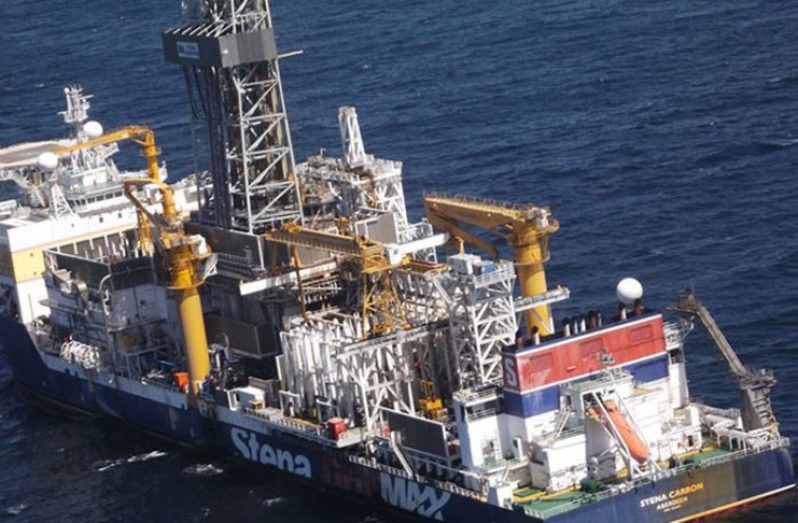…Gov’t seeks new production sharing agreement with Exxon
GOVERNMENT, in a revision of the existing template of the Production Sharing Agreement (PSA) with ExxonMobil, is to be more accommodating to changing commodity prices while maintaining a level of progressivity that is responsive to profitability.
This was announced when Finance Minister, Winston Jordan, presented the country’s $276.1B budget in the National Assembly on Monday. Under the agreement signed between the Guyana Government and ExxonMobil and its partners, this country will be entitled to 50 per cent of the proceeds from whatever oil and gas resources are extracted by the company in the Stabroek Block. A PSA is usually signed between governments and companies involved in resource extraction to determine how much of that resource the parties will receive.
Jordan reminded the House that in 2017, three additional oil discoveries in the Stabroek Block were announced: Payara, Snoek, and Turbot. He said while the quantity and quality of the latter two discoveries are still being assessed, the gross recoverable resources for the Stabroek Block is now estimated to be between 2.25 – 2.75 billion oil-equivalent barrels, making it one of the most significant global finds in recent years. “These discoveries have derisked the basin, which is estimated to contain at least 7 billion oil-equivalent barrels, and has resulted in the significant ramping up of exploration activities in other already-allocated off-shore blocs,” Jordan said.
He told the House that in light of the recent discoveries in the Stabroek Block, government anticipates significant interest in exploring the unallocated blocks of its derisked, off-shore basins. “As such, it is imperative that we safeguard the rights of our nation to a fair share of resource wealth. While we strengthen our ability to negotiate more equitable PSAs, key Government agencies within the recently-established Inter-Ministerial Technical Committee on petroleum to continue to coordinate capacity building and interactions with the industry.”
The committee‘s agenda in the immediate future will focus on coordinating capacity building, information sharing, as well as providing input into the development of a legal and institutional framework to support the Sovereign Wealth Fund (SWF). According to Jordan, the development of a rules-based SWF is critical to ensuring that resource revenues are responsibly managed within a transparent framework that promotes the highest levels of accountability. He noted that the SWF will not just serve for investment, but also to save for future generations and to stabilise the economy in times of global economic instability.
“During 2018, we will publish a green paper to apprise this Honourable House on the proposal for the SWF and to seek feedback for further refinement, and to stimulate a national discussion to ensure that all citizens understand the benefits to be had and the perils we must guard against in the collection and management of our oil resources,” Jordan said. In addition to the establishment of the SWF, the finance minister said in 2018, the Petroleum Commission will be operationalised after the anticipated passage of the Petroleum Commission Bill.
The Commission will be tasked with monitoring and regulating this new and emerging sector, with a mandate to ensure that the exploration, development and production of petroleum are done in an efficient, safe, effective and environmentally responsible manner.
“Mr. Speaker, while we continue to build capacity for effectively managing and regulating the oil and gas sector, we will ensure that systems and regulations are in place to properly and transparently account for, and manage oil revenues. Specifically, an oil and gas unit will also be established within the GRA, and will benefit from extensive training in revenue administration within the context of PSAs. The prudent management of these revenues, in addition to a well-thought out development plan, will help to guard against the resource curse.”
Jordan said to also prepare the private sector for rapid growth in this sector, government will be hosting an Oil and Gas Exposition and Business Summit in the first quarter of 2018, to bring together various segments of the private sector towards creating partnerships and facilitating information-sharing for business opportunities.
The minister said although oil remains the main focus of this emerging sector “we are carefully exploring the feasibility of utilising natural gas as a temporary alternative for power generation. In the coming year, further steps will be taken to identify the preferred option for transporting gas onshore, including the most suitable location.”
Jordan also hailed Guyana’s achievement of becoming a candidate member of the Extractive Industries Transparency Initiative (EITI). He said next year, the country will support the EITI Secretariat in the implementation of its work plan as we embark on the 18-month journey to full membership. At that time, Guyana would have met a global standard for the good governance of oil, gas and mineral resources.
This standard requires information along the extractive industry value chain, from the point of extraction to how the revenue makes its way through the government and its contribution to the economy. These efforts serve to demonstrate our commitment to responsible and effective governance in the pursuit of sustainable development.



.jpg)









